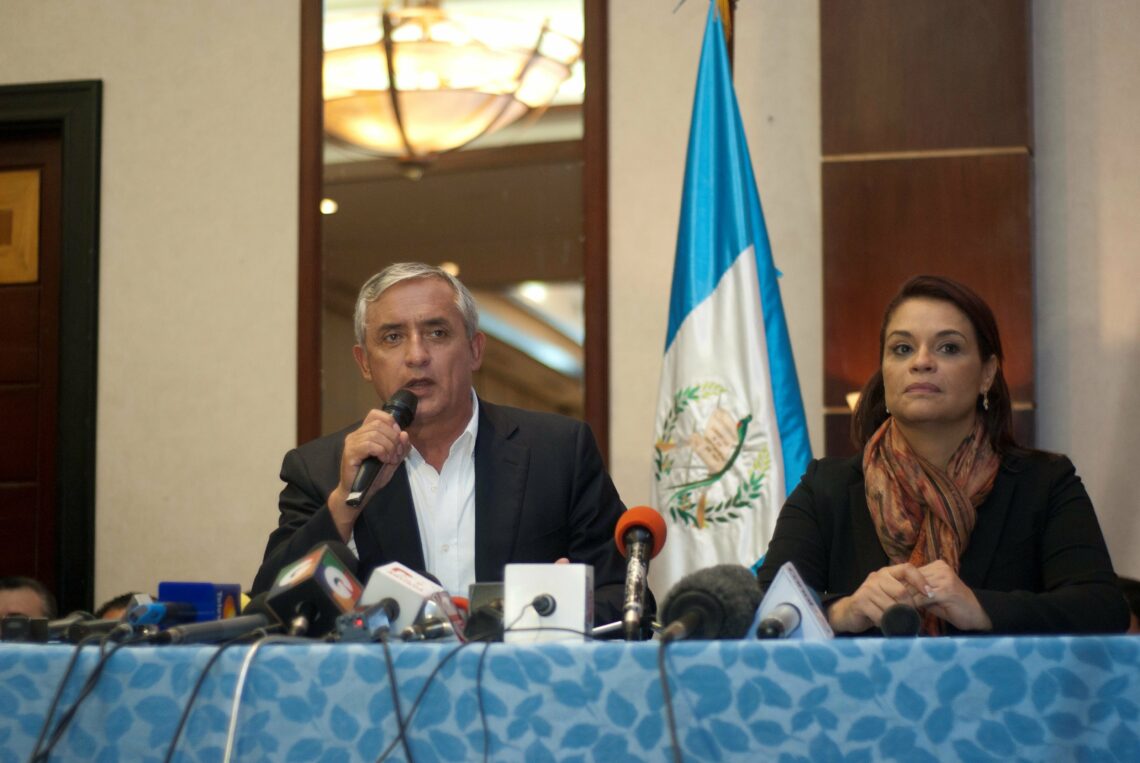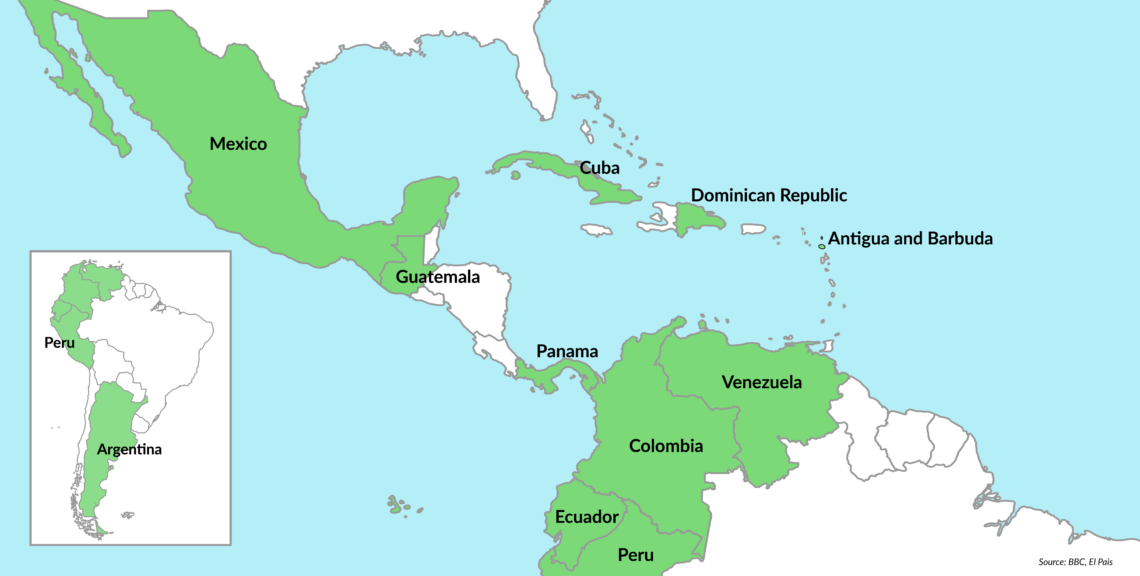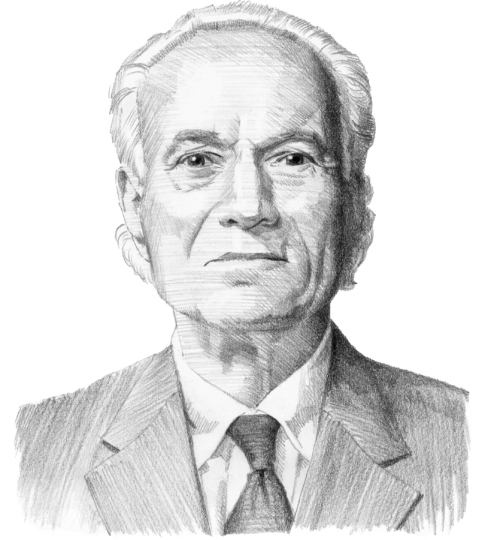The geopolitics of corruption in Latin America
The rise of the middle class and the boom in information technology have made corruption less acceptable than it once was in Latin America. Nevertheless, graft remains a problem across the continent. Constitutional reforms could improve the situation, but Latin American countries are more likely to rely on new legislation.

In a nutshell
- Latin America is still experiencing the fallout from the Odebrecht scandal
- Many countries now have independent judiciaries able to pursue corruption
- Institutional change is needed in addition to convicting corrupt individuals
Half a decade has passed since an investigation into a small Brazilian money laundering scheme operated at a local car wash (Lava Jato) ballooned into a corruption investigation on a global scale. The Odebrecht scandal, as the enterprise ultimately became known, extended to virtually every corner of the Americas, and investigations stemming from it have led to the downfall of governments and the imprisonment of presidents.
Today, corruption and the fallout from Odebrecht remain the most salient factors in Latin American political life, and its economic and geopolitical importance can hardly be overstated: corruption delegitimizes state institutions, hampers foreign investment and weighs on economies that might otherwise grow more rapidly.
Grudging approval
For centuries, Latin America has experienced deeply entrenched corruption in its public institutions – so entrenched, in fact, that the line often has blurred between corruption and routine, institutionalized political practice. In Brazil, for example, there is a well-known expression: rouba, mas faz – “he steals, but also gets things done.” This was considered a stamp of grudging approval for generations of Brazilian politicians. What, then, has prompted this wave of outrage and legal investigation against a practice that has long been seen as just a part of the game?
Many factors have converged to make corruption less acceptable than it once was. First, the commodity boom of the 2000s catapulted 70 million Latin Americans into the middle class, folding them into the formal public policy process and making them less tolerant of traditional abuses. Moreover, the pervasiveness of mobile phones, cameras, recording devices, and messaging groups in which media can be instantly shared have made it easy to document and rapidly disseminate incriminating material. Clandestine recordings, in particular, have led to shock and outrage as voters witness the negotiations and exchanges behind closed doors that have long constituted the rules of the game.
Many factors have converged to make corruption less acceptable than it once was.
The explosion of allegations across the region may create the impression that corruption has suddenly emerged, or that Latin America’s democracies have failed to establish themselves effectively. That is misleading. This tidal wave of corruption investigations is better understood as a success of democratization that is simultaneously emblematic of the incompleteness of democratic consolidation.
On one hand, many Latin American countries have, for the first time in their history, independent judiciaries with the ability and autonomy to pursue corruption, as well as increasingly strong social groups which have leveraged social media to demand accountability from elected officials. On the other hand, the corruption they are uncovering is often the direct byproduct of weak party structures and institutional designs that essentially oblige presidents to “purchase” votes to support their mandate in the legislature.
Vindication and lawfare
One consequence of the political fallout from Odebrecht has been the rise of unorthodox candidates who wear the mantle of populism and declare the entire system sick and beyond redemption. Brazil’s Jair Bolsonaro and Mexico’s Andres Manuel Lopez Obrador (widely known as AMLO) are two examples of this phenomenon. Both were elected more as a rejection of what preceded them than as an affirmation of what they offered. And, though both have pledged to root out corruption, their personality-based political styles virtually assure that their presidencies will not strengthen party and coalition systems in a way that reduces the need for vote-buying by enhancing basic democratic governance institutions.
Public outrage over corruption scandals creates a powerful incentive for political leaders to punish the guilty rather than focus on reforms that would prevent future recurrences. Retribution can quickly become politicized. In Brazil, Judge Sergio Moro became an international sensation for his relentless prosecution of those involved in the Odebrecht scandal. He subsequently accepted an appointment as attorney general under President Bolsonaro. That move raised eyebrows, as Mr. Bolsonaro’s election relied in large part on Mr. Moro sending former president Luis Ignacio da Silva (widely known as Lula) to prison, thus eliminating him as a rival candidate.
Supporters of Lula cried foul, suggesting that the judge’s ascendancy within the Bolsonaro government reeked of conflict of interest. This June, those supporters were vindicated when text messages were published showing that Mr. Moro had coordinated with the prosecution to effectively stack the odds against former president Lula during his trial. Now, half of the Brazilian electorate can reasonably claim that the Odebrecht investigations have become politically weaponized, which is unfortunate, since the vast majority of convictions have been fair.
The use of “lawfare,” or politically-motivated criminal accusations, has long been a concern in Latin America. Unfortunately, that concern has led to widespread immunity policies that often inhibit anti-corruption efforts. Though originally intended to shield politicians from politically-motivated charges – especially in fragile democracies that were, at the time, emerging from military dictatorships where dissent was criminalized – parliamentary immunity has often resulted in de facto impunity for corrupt officials. Major reforms have been proposed in several countries, though the reforms differ in important ways and have political ramifications that are unique to each country.
Brazil
In Brazil, over 40,000 officials are granted some form of “privileged jurisdiction” (foro privilegiado) – meaning their cases can only be heard in certain high-level courts. Because those courts often suffer from overwhelming caseloads, “privileged jurisdiction” often has amounted to full protection from the rule of law, as the statute of limitations can easily expire before a court reviews a case.
Outrage creates an incentive to punish the guilty rather than focus on reforms.
Recent reforms enacted by the Brazilian Supreme Court significantly expanded the number of courts that can review high-level cases, yet even with those reforms in place, actual convictions in high-level corruption investigations have been few and far between, despite hundreds of ongoing Odebrecht and Lava Jato-related investigations.
Argentina
In Argentina, efforts to change traditional legislative immunity would have enormous political consequences. Former president and current Vice President Cristina Fernandez de Kirchner is the defendant in nearly a dozen ongoing criminal trials. Among the explosive accusations against her are charges stemming from the “cuadernos de las coimas” (or bribery notebooks), a meticulous set of journals kept by the chauffeur of a senior official in Ms. Kirchner’s own Planning Ministry that documented kickbacks and bribes that amounted to hundreds of millions of dollars, made over the course of a decade. Earlier in October, Ms. Kirchner was ordered to trial on charges related to the scheme. Yet her status as a senator or now as Vice President-elect means that, unless the Senate votes to remove her immunity, she cannot be subject to criminal prosecution, and her popularity as a political figure means that any attempts to alter Argentina’s immunity protections would face enormous resistance.
Peru
Similarly, in Peru, efforts by President Martin Vizcarra to change long-standing immunity protections have faced resistance in Congress, which, under current law, must authorize any prosecution of one of its members. Peru is already reeling from the shocking death of former president Alan Garcia, who committed suicide rather than face Odebrecht-related charges. Three other former presidents are either in prison or facing extradition from abroad. All stand accused of using Odebrecht money to fund their political campaigns, a charge that has also led to the imprisonment of opposition leader Keiko Fujimori.
President Vizcarra’s popularity has surged as he has proposed fundamental reforms to Peruvian electoral law, some of which passed by referendum earlier this year. Faced with obstruction in Congress, Mr. Vizcarra has vowed to hold early elections. Under the terms of one of the referenda approved in June, neither he nor any sitting member of Congress can serve consecutive terms – so his threat effectively amounts to a full reset of Congress.
Facts & figures
Countries involved in the 2016 Odebrecht corruption scandal

Another vexing challenge faced by President Vizcarra is how to revive Peru’s mining economy after the cancellation of several huge Odebrecht infrastructure projects. These projects withered once it was discovered that they had been facilitated by presidents who received hefty bribes, in spite of tremendous opposition from indigenous and environmental groups. Mr. Vizcarra has now proposed a fundamental reform to Peru’s mining laws, including a new requirement that mining projects craft a “Territorial Development Plan” to show how their projects will benefit local communities. Reforms that appease concerns around the trampling of indigenous rights will be essential to protect the $50 billion of foreign direct investment slated for new mining projects over the next half-decade. Without that investment, the Peruvian economy will stall.
Central America
Though the Odebrecht scandal has not played out as prominently in Central America, deeply entrenched corruption has nonetheless played an important role in recent political events there. Since 2006, Guatemala has relied on the International Commission Against Impunity in Guatemala (or CICIG, by its initials in Spanish) to investigate charges of corruption and public wrongdoing. This UN-sponsored initiative was widely perceived as a model for other states suffering from endemic corruption. Over the course of its mandate, CICIG was responsible for dozens of high-profile investigations and, ultimately, over 400 convictions – including, most importantly, the arrest of a sitting president, Otto Perez Molina, and his vice president Roxana Baldetti. (Here, too, his ultimate prosecution required Congress to vote to strip him of immunity.)
Mr. Perez Molina’s successor, a comedian named Jimmy Morales who was elected on a slogan of being “neither corrupt nor a thief,” soon found himself under investigation by CICIG for potential corruption. In response, President Morales moved ruthlessly to shut down the commission’s work, first barring its commissioner, the Colombian jurist Ivan Velasquez, from entering the country, then refusing to extend the commission’s mandate, which expired in September 2019, giving the staff one year to transfer its activities to Guatemalan authorities. In presidential elections held this August, Conservative candidate and former prisons director Alejandro Giammattei prevailed after crusading anti-corruption advocate Thelma Aldana was disqualified on trumped-up charges of – what else? – corruption. President Giammattei has made it clear he has no intention of restoring CICIG. The latter has now officially ended its mandate and it is not clear what fate the anti-corruption campaign in Guatemala will have in the coming years.
Neighboring El Salvador, however, has launched its own anti-corruption commission, inspired by CICIG and fulfilling a promise made by newly-elected president Nayeb Bukele. Called CICIES and clearly modeled after CICIG, the Salvadoran commission thus far has the backing of the Organization of American States, which has already sent a team of jurists to support the commission, but it is unclear if the United Nations will play an analogous role. The presence of UN jurists who could operate autonomously within Guatemala was viewed as key to CICIG’s success, and the lack of such jurists in a similar Honduras Commission (called MACCIH) has contributed to its lackluster results. Whether or not Mr. Bukele insists on UN involvement will be a gauge of his seriousness about fundamental reform.
Venezuela
Corruption may be a broadly-shared characteristic of Latin American political systems, but it expresses itself on a spectrum of severity, with countries like Chile on the low end of the spectrum, and countries like Guatemala on the very high end. But no country has achieved the thorough institutionalization of corruption seen in Venezuela, which is truly in a class of its own. While countries like Brazil and Peru work to address corruption that primarily amounts to vote-buying and skimming off the top of infrastructure contracts, the Venezuelan state is best understood as a system that has been fully co-opted to serve the interests of a governing elite. Recent results from a three-year investigation by the research organization InSight Crime reveal the extent to which Venezuela has become a “mafia state” where criminality and corruption are practiced on an “industrial scale.” Billions of dollars have been embezzled from the state-owned oil company, Petroleos de Venezuela S.A., and the U.S. Justice Department recently unveiled charges that link Venezuelan officials at the very highest levels, including former president Hugo Chavez, with narco-trafficking schemes.
Restoring confidence in Venezuelan institutions will be a generational task.
Nothing short of regime change will return Venezuela to even the corruption level of its neighbors. Restoring confidence in Venezuelan institutions will be a generational task. But for other Latin American countries – grappling with the fallout from Odebrecht, but still legitimate international actors – there are policy steps that could reduce the likelihood of recurring corruption.
Scenarios
One major driver of corruption is the failure of Latin America’s hybrid presidential-parliamentary systems. Constitutional reform could drastically alter the dynamics of corruption in Latin American political systems. Brazil is a paradigmatic example. Because Brazil elects a president according to a majoritarian model (sometimes called first past the post) but elects its lower house of Congress according to a parliamentary model, it is practically inevitable that the President will not arrive in office with a party that commands a majority in Congress. (Moreover, Brazil’s “open list” system of elections does little to foster party loyalty, so even candidates for Congress often run on the force of their personalities in an effort to outperform members of their own party.) The result is a highly fractured Congress. One rather obvious way to build coalitions in such a system: buy votes, often using funding from major bidders on government contracts.
Constitutional reforms that would change this fundamental dynamic are unlikely to happen quickly, if at all. Other steps could be taken. One successful technique that has already been implemented in some Latin American countries is to put the onus on private corporations in the style of the Foreign Corrupt Practices Act passed in the United States in 1977. The FCPA has already played an important role in bringing the Odebrecht scandal to light; since Odebrecht funds passed through U.S. financial institutions, American investigators were able to interrogate Odebrecht executives about the global extent of their scheme.
Argentina and Brazil have already passed FCPA-like legislation, and companies throughout the region are responding by frantically shoring up their compliance efforts. The Odebrecht scandal demonstrated that cultures of corruption will bring monetary penalties and, worse, enormous reputational consequences in this new era of anti-corruption efforts. If countries throughout the region are able to pass FCPA-like legislation that has real teeth, this scenario would see Latin America’s political systems change by way of the private sector, which would be powerfully discouraged from participating in “politics as usual.” An excellent example of how such incremental reform can work is the Alliance of the Pacific in which Chile, Peru, and Colombia have put in place agreements in accordance with the rules of the FCPA. These reforms have been encouraged by Transparency International, an NGO with origins in Germany and with affiliates in nearly every country in the region.
A less likely scenario would involve substantial reforms that restructure the way public financing and accounting takes place in Latin American political systems. Drastic changes in the accessibility of data related to public infrastructure bidding could make it more difficult to inflate prices in the future, particularly if social institutions arise to carefully monitor the data. One element of Odebrecht’s leniency agreement with Brazilian prosecutors includes funding a new institute, called Observ, which will assess public bidding processes. Similarly, in the judicial realm, reforms could provide more access to information about judges’ salaries, academic and professional qualifications, the lengthy delays in trials that often result in de facto impunity. For governments to truly provide meaningful open data, they need to pass legislation that adheres to international standards on data provision, which allow analysts to compare data from across countries. Thus, this scenario requires not simply technocratic changes but legislative reforms. Without the trifecta of better technologies, better laws, and a robust civil society to monitor the new data output, open data reforms will be largely meaningless.
Rodrigo Valdes, who served as Finance Minister in Chile under former president Michelle Bachelet, remarked astutely after corruption revelations that “the people want blood, not laws.” Punishments for corrupt legislators are important. But progress will be made by strengthening the institutions that fostered corruption, rather than punishing the actors who operated inside those institutions. Those countries that commit to that harder task will stand the best chance of not being rocked again and again by crippling scandals and investigations. In addition, they will be the countries that are considered the most legitimate international actors and which provide the most hospitable environment for foreign investment.








